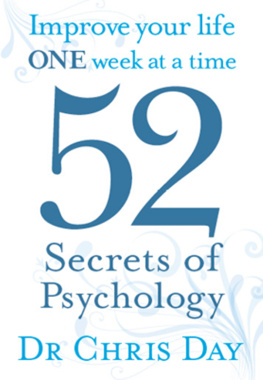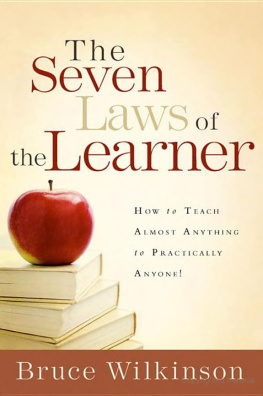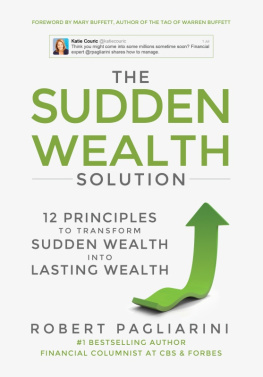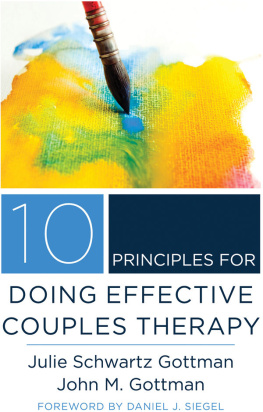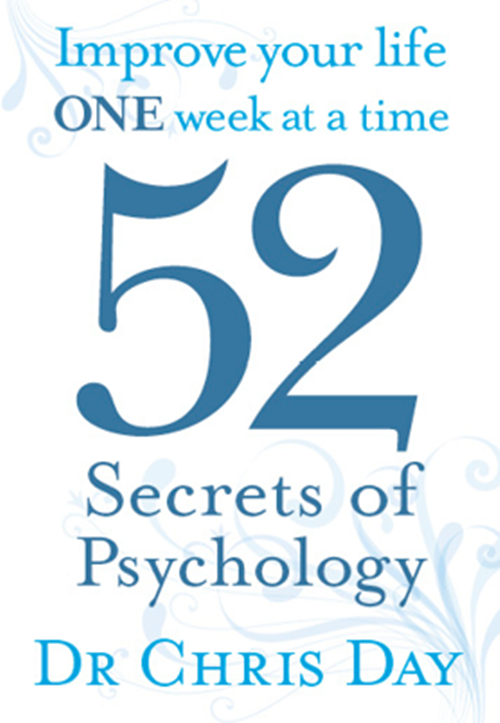
The information presented in this eBook is not intended to be a substitute for professional advice, diagnosis, or treatment. Seek the assistance of a psychologist or GP for treatment of any perceived psychological condition.

Enlightened Publications, Brisbane Queensland, Australia.
eBook first published in 2014.
Copyright Dr Chris Day 2014.
The moral right of the author has been asserted.
All rights reserved. Without limiting the rights under copyright reserved above, no part of this publication may be reproduced, stored in or introduced into a retrieval system, or transmitted, in any form or by any means (electronic, mechanical, printing, recording or otherwise), without the prior and explicit written permission of the author of this eBook.
Cover design by Wag Design, Brisbane Qld, Australia.Designed by Saori Hanatani for Wag Design .
www.drchrisday.com

The happiness and g reatness, the rank and station, the pleasure and peace of an individual have never consisted in personal wealth, but rather in excellent character, high resolve, breadth of learning and the ability to solve difficult problems.
Abdul-Baha

T estimonials
Tips that can spark those light bulb moments and change a lifes course
Lucy Clark, The Sunday Mail
Sound and practical. a little gem 4 stars
Sarah Minns, Good Reading Magazine.
Practical easy to follow inspires emotional growth...
WB, Lawyers Weekly.
Easy to read, practical, tried and true solutions
Medical practitioner Dr Alex Ha
These words of wisdom can help clarify our muddled thinking and set us on a better path.
Keith McDonald, The West Australian
Top of best-seller list
Independent Bookstores, Brisbane
I ntroduction
The idea for this book came from my years of clinical practice .
Over time I have found that there are a number of key concepts and principles that consistently give people insight into their situation .
I have seen that as the light dawns in the minds of my clients, and the principles are practiced and integrated in their lives, everything begins to change for the better .
The way they look at the world improves, situations that used to be so upsetting, and people who used to be so frustrating and distressing, somehow do not bother them so much anymore . This is not to say that they have no problems, rather, it is that they are better equipped to deal with them .
Many of my clients have asked me why these principles are not taught in school, or why their parents didnt tell them these things . I think the answer is probably that some teachers and parents dont know these principles, and that others know them at an intuitive level but never clearly articulate them.
I know through my clinical practice that many people struggle with their lives and relationships . When I considered my responsibility in this matter I decided to pass on this information, preferably before people get as distressed as the people I see clinically.
This is my motivation for writing . May this book be of service to you.
F irst principles
Conceptual framework
What is your lifes work?
One of the most fundamental human questions is Why am I here? or, What is the meaning of life?
Naturally, everyone must answer this question for themselves .
However, when people ask me this, I tell them that for me there are two important tasks in life .
The first is to turn yourself into someone you can respect . No one wants to feel badly about themselves, and at some point everyone feels like they have made poor choices or that they have not acted well .
To help you figure out what kind of person you want to turn yourself into, think about what you would like to hear your loved ones say about you . What would you like to think you bring to the lives of the people you value the most?
After you identify the qualities you most admire, you will inevitably embark on a lifelong quest for awareness, self control and the development of your capabilities.
The second task in life is to make a contribution . No one wants to feel sidelined and useless, and in some ways you know who you are by seeing what you have done . What do you devote time to? Do you think that is important? What do you think is important? What would it take for you to become involved in making a meaningful contribution to your world?
These two tasks involve effort . However, once you have identified what is important to you, you will have guiding principles that underpin everything you do.
H ow to use this eBook
The layout
The eBook has been laid out so that there are 52 short, easy-to-read passages .
My thought was to give you a principle a week for a year . However, if you implement even one of these principles over the coming year, it is my experience that your life will be changed for the better.
The system
There are a couple of good ways to use this eBook . Which you choose will depend on which suits your personality.
The first way is to read through the eBook to get a sense of it. As you do this, remember the sections you find the most relevant and start with those.
The second way is more systematic . I suggest that after skimming through the eBook, you return to the beginning.
I have put the first few principles at the beginning because they provide a conceptual framework for all those that follow . For some of us it is easier to proceed when we have a solid understanding about what we are doing and why.
The process
Either way, the actual process I suggest is the same for both:
Focus on one at a time . Give each passage a week . You may need to read it many times until you fully understand it . Then spend time thinking about how it applies to your life .
From time to time over the next few days, focus on becoming aware of what you are currently doing and what the consequences of that are .
Then think about whether things would be better if you changed what you do . How could you change? Where could you begin to implement this principle? What impact would it have on you and those around you?
Before you act, spend a little time thinking about what you are hoping to achieve by changing your behaviour . Make sure your motive is to make your life better rather than making someone elses life worse. This makes an enormous difference to the outcome.
Also, think about the how, what, why, when, where of it .
When you are convinced about the advantages, begin to implement the principle . Take it slow and be patient with yourself . Remember that when you learn anything new it takes practice.
As you begin to make changes, you will need to keep thinking about it . You need to assess and reassess so you can fine tune both your motives and your actions . As you do this you will find that the new thinking and behaviour becomes second nature.
Of course it is a little easier to do this when you are having a regular counselling session because you have someone to debrief with and to help you figure out next steps .
If you decide to take this process seriously you could buddy up with a friend and try to help each other . The process is the same as it would be with a counsellor . Take turns to debrief, help each other to reflect on the process, to stay focussed, and to figure out the next steps.
Next page
